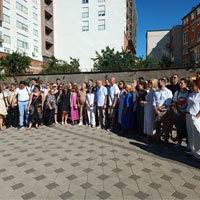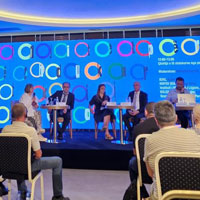
Many of these crimes, ordered by top political figures of the Federal Republic of Yugoslavia (SRJ) and MUP Serbia, were independently masterminded and planned by the highest ranking commanders of the PJP. Radoslav Mitrović, commander of the 37th PJP battalion is being tried before the War Crimes Trial Chamber of the Belgrade District Court for issuing an order to kill Albanian civilians in Suva Reka/Suharekë on March 26, 1999. Other police commanders and police officers who committed dozens of killings and other serious war crimes in Kosovo, instead of being criminally prosecuted or removed from police force, are as a matter of fact being promoted in their work environment. Some of them, indisputably proven not only to have committed war crimes but also to have forced other police officers to commit murder or conceal the evidence of war crimes, became high officials of the Independent Union of the Police Force of the Republic of Serbia and presidents of police union groups in a number of towns across Serbia.
Based on the testimonies of police officers who were determined to resist orders to kill and persecute helpless and unarmed civilians, the Humanitarian Law Center has collected a body of relevant evidence based on which it was concluded that there was a reasonable doubt that Radoslav Mitrović, commander of the 37th PJP battalion, Nenad Stojković, commander of the Fourth Company of the 37th PJP battalion, other commanding officers and members of the 37th PJP battalion, acting on a previously adopted plan and agreement, had committed a number of murders of unarmed Kosovo Albanians and wounded prisoners as well as a number of other war crimes, and that they were criminally responsible for committing the criminal act of a war crime against the civilian population from Article 142, Paragraph 1 of the Criminal Code of the Federal Republic of Yugoslavia (KZ SRJ), in relation to Article 22 of the KZ SRJ, as accomplices, while several of them, including Mitrović and Stojković, were concluded to be criminally responsible for committing the criminal act of a war crime against the wounded and the sick from Article 143 of the KZ SRJ, in relation to Article 22 of the KZ SRJ, also as accomplices.
In the criminal complaint submitted to the Office of the War Crimes Prosecutor, the HLC, among other things, listed the following events which undoubtedly indicate the responsibility of the aforementioned commanding officers of the 37th PJP battalion:
1. “On an undetermined date of October 1998, the entire 37th PJP battalion participated in an operation aimed at taking control of new positions in the direction Leskovec village – Ljubičevo – Lješkovo, in the Prizren municipality. In the early afternoon hours, a group of soldiers, members of regular Yugoslav Army (VJ) units, took three Albanian men, each approximately 25 years of age, into the Fourth Company of the 37th PJP battalion. The detained Albanians were handed over to Nenad Stojković, as the commander of the Fourth Company and to other police officers from the Fourth Company present at the time, who were subordinated to Nenad Stojković. The VJ soldiers told them that they had arrested the Albanians at the time they were on the road walking with two saddled horses. At the time they were arrested, the Albanians told the soldiers that they were on their way to gather firewood. The Albanian men repeated the same story to Nenad Stojković, the subject of this criminal complaint, and other police officers members of the Fourth Company [the identity of whom is established in the criminal complaint]. Many of the police officers and other members of the Fourth Company saw for the first time arrested Albanians and they watched everything carefully. Soon after, the three detained Albanian men and the Company commander Nenad Stojković who questioned them, found themselves surrounded by a group of police officers, members of the Fourth Company, and having received an approval from Nenad Stojković, started to beat them brutally and mercilessly. They punched them and kicked them with their army boots; they hit them about the head, in the stomach, in the groin, and all over the body. While the Albanian prisoners were being beaten, Nenad Stojković used his Motorola to call Čegar 1, which was the secret code name for Radoslav Mitrović, commander of the 37th PJP battalion. These police officers, members of the Fourth Company, who witnessed the scene [the identity of whom is established in the criminal complaint], heard that Nenad Stojković, the Company commander, informed Radoslav Mitrović, the commander of the 37th PJP battalion that he had arrested three younger Albanian men and asked him what to do with them. They heard Radoslav Mitrović reply: “Make sure they get enough sun tanning” which was a coded order to kill the three men, because “sun tanning” meant killing. Shortly after, acting upon the order issued by Radoslav Mitrović, Nenad Stojković, the Company commander and the superior officer, ordered two police officers [the identity of whom is established in the criminal complaint], in front of all of the present policemen from the Fourth Company, to kill the three Albanian men. In executing the order, those police officers handcuffed the three Albanians and took them to a little valley, some 50 meters away from the place where they were questioned, and killed them by two longer machine-gun bursts. One of the two police officers, executors of the murder of the Albanian men, said on a later occasion that they had forgotten to take the handcuffs from the hands of the captured Albanians and that he went back immediately to the execution site to retrieve the handcuffs. He noticed that one of the men was still alive and he shot him dead.”
2. “Starting September 1, until October 1998, as ordered by Radoslav Mitrović, the commander of the 37th PJP battalion, subject of this criminal complaint, the Fourth Company took part in what was known as the “terrain sanitation” (“čišćenje terena”), of Albanian villages in the area of Drenica, Bajgore, Ćićevica, and Jezerske Planine. In one such operation, in the first half of September 1998, in a remote, old, mountain Albanian house, which was painted pale green in the ground floor area and in the area around the entrance, and which was located not far from and on the right side of the road leading to Stari Trg near Kosovska Mitrovica in the direction of the Bajgora Mountain, members of the Fourth Company of the 37th PJP battalion noticed that there were people inside. They approached the house carefully and the Company commander Nenad Stojković and several police officers, members of the Fourth Company [the identity of whom is established in the criminal complaint] entered the house. After spending a short time in the house, they drove five Albanians from the house: three men, two of whom were approximately 45 years of age while the third one was a younger man – probably 20 years old, and two women, one over 50 years of age and the other about 25. They might have been a mother and a daughter, or a mother-in-law and a daughter-in-law. In the front yard, in front of about one hundred police officers and police company commanders, after a very short questioning, Nenad Stojković, the Fourth Company commander, firing from a short range from his automatic rifle, killed one of the two older Albanian men. Immediately after that, following the example set by the Company commander Nenad Stojković, a police officer [the identity of whom is established in the criminal complaint] took aside the other older Albanian and took him to an orchard, 50 meters away from the other policemen and the man’s family members, ordered him to go down on his knees, to turn his face towards him, and killed him on the spot by a short burst from his M/84, calibre 7.9 machine-gun. Company commander Nenad Stojković and several police officers subordinate to him took the two Albanian women back to the house while the younger Albanian man stayed in the courtyard in front of the house, in the company of other police officers from the Fourth Company. After a short while, they heard a number of short bursts from automatic weapons from the house and the police officers standing outside concluded that their colleagues and commander Stojković must have killed the Albanian women. After that, Commander Nenad Stojković walked with the young Albanian at the end of the convoy formed by the members of the Company, as he ordered the company to move along a local road. A diversion/reconnaissance unit (DI unit) was in front of them at a 10 meter distance. During the half hour that they were on the move, the Company commander Nenad Stojković and some other police officers kept claiming that this young Albanian was a member of the Kosovo Liberation Army (KLA/OVK) and showed the other company members a handmade green cotton vest with stitched-on pockets, claiming that such pockets were used for carrying automatic rifle rounds and that it was the reason the young Albanian wore such a vest. Stojković himself read this young Albanian’s identification document and gave it to the other policemen to read and they were able to see that the young man was from Kosovska Mitrovica. Nenad Stojković kept the identification document and other documents belonging to this man. Some of the police officers beat the Albanian man and threatened to kill him if he did not admit that he was a member of the KLA/OVK. As they were going over a steep slope, the young man tried to escape. He jumped to the side abruptly and rolled down the slope. Nenad Stojković and a number of police officers fired at him immediately and most probably killed him because Nenad Stojković later bragged that no prisoner ever escaped alive from him and that there was no need to send a patrol unit after him.
Approximately one kilometre away from the above described house, at the place where the Fourth Company of the 37th PJP battalion of the Republic of Serbia was about to spend the night, the police officers noticed another Albanian house standing alone. It was also an older, mountain-type rambler, about 30 meters on the right side of the road along which the Fourth Company was moving from Stari Trg in the direction of Mount Bajgora, above Kosovska Mitrovica. Nenad Stojković, the Fourth Company commander, the subject of this criminal complaint, and the Command Unit of the Fourth Company entered the house. Stojković ordered the rest of the Company to bivouac around the house, i.e. along the road because there were no other houses in the area. During the night and in the morning of the following day, the police officers from the Fourth Company [the identity of whom is established in the criminal complaint] saw that a middle aged Albanian woman and a man approximately 30 years of age went in and out of the house a number of times. The man appeared to be living with serious mental disabilities because he was unable to walk or communicate on his own. In the early morning hours of that day, while the Company was getting ready to move on in the direction of Bajgora after having breakfast, the police officers from the Fourth Company heard shots being fired in the house while the Company commander Nenad Stojković and the Command Unit of the Company were still inside. Shortly after they saw smoke rising and flames engulfing the house just as the Company commander Nenad Stojković and the members of the Command Unit of the Fourth Company were stepping outside. All police officers and commanding officers of the Fourth Company of the 37th PJP battalion heard the shots and saw the burning house. They all knew that Nenad Stojković and the police officers from the Command Unit of the Fourth Company killed the Albanian woman and the sick man in their own house where they left them to be incinerated.
By filing this complaint the Humanitarian Law Center fulfilled its legal obligation to report on those suspected to have committed most serious criminal acts which are subject to ex-officio criminal prosecution as stipulated in Article 253 of the Criminal Procedure Code.
HLC reminds the state authorities of the Republic of Serbia in charge of detecting and criminally prosecuting perpetrators of war crimes that it is their legal obligation to file criminal complaints against such persons, and that they should stop the practice of covering up evidence on war crimes committed in Kosovo which stands in the way of establishing the rule of law in Serbia.






